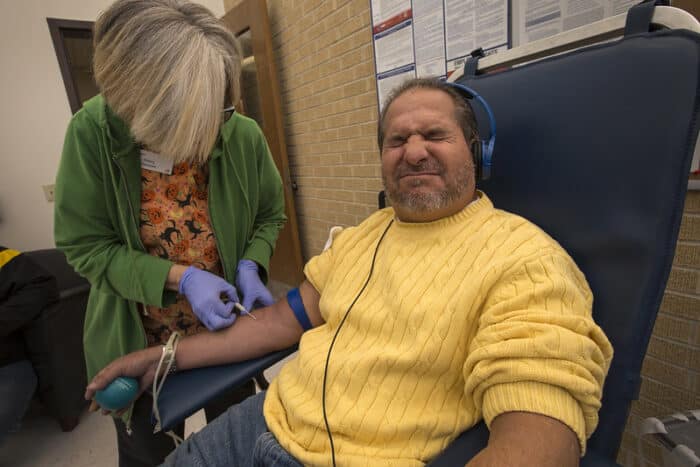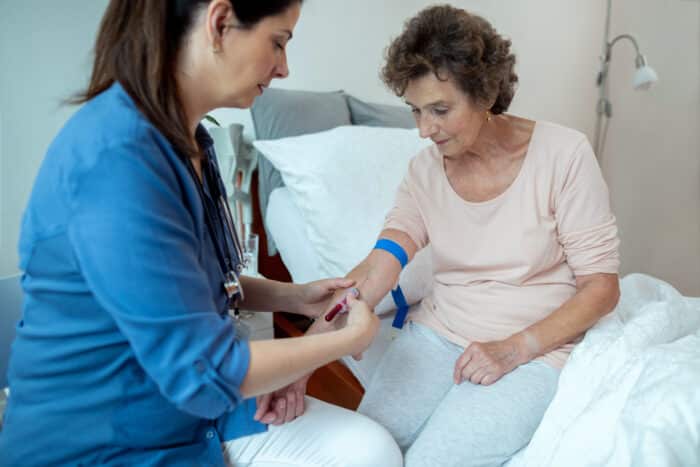Are you interested in pursuing the rewarding career of phlebotomy?
If yes, have you also wondered what phlebotomists do on a day-to-day basis?
If you answered yes again, this article is for you.
In this article, we will uncover the main roles and responsibilities of a phlebotomist and more.
So let’s tune in.
Also read: What is a Phlebotomist
What Do Phlebotomists Do?
Phlebotomists are the unsung heroes of the healthcare team since their key role involves drawing blood for the diagnosis of various illnesses.
But what are the other responsibilities of a phlebotomist? Let’s find out.
The roles and responsibilities of phlebotomists can be divided into two broad categories: clinical and administrative. Let us take a look at each of them.

Do You Want To Become a Phlebotomist? Check Out Free Phlebotomist Masterclass!
In our masterclass you learn:
- How to be a Phlebotomist faster…in just 2 months!
- Avoid student debt & driving to classes
- #1 thing employers want from Phlebotomists
- How to stand-apart & get a university certificate for a strong resume
Clinical Duties
- Venipuncture Techniques: Phlebotomists are experts at performing venipuncture, which means they skillfully draw blood from veins in patients. This needs to be done with care and empathy to make patients feel more at ease.
- Comfort and Safety: Making sure patients are comfortable and safe during blood collection is a top priority for phlebotomists. They also use their skills to find the best veins and use techniques to reduce any discomfort or problems.
- Protocol Adherance: Phlebotomists need to follow strict guidelines to keep samples clean and accurate. They carefully label, transport, and store samples according to guidelines to ensure the right results.
- Detailed Documentation: Keeping accurate and complete records is very important for phlebotomists. They write down patient information, details about samples, and how the procedure went. This helps everyone stay informed and lowers the chance of mistakes.
- Collecting samples timely: Phlebotomists must work fast to collect and handle blood samples. This helps doctors make accurate diagnoses and treat patients on time.
Read: How to Become a Phlebotomist
Administrative Duties
- Patient Communication: Phlebotomists talk to patients and explain what they need to do before and after tests. This helps patients feel comfortable and informed during the procedure.
- Keeping Accurate Records: Phlebotomists make sure patient records are correct. This helps to keep track of samples and avoid mistakes.
- Taking Care of Supplies: Phlebotomists also manage tools and supplies. They make sure everything they need is ready so tests can be done fast and the clinic or hospital runs smoothly.
- Team Work: Phlebotomists team up with other healthcare workers. They talk to each other to organize how samples are collected, processed, and shared.
- Checking for Quality: Phlebotomists help make sure equipment is working well for accurate results. They also find and solve problems in how samples are collected and handled.
See: Which Two Skills are Important for a Phlebotomist?
What Color Scrubs Do Phlebotomists Wear?
You can find phlebotomists usually wearing scrubs of blue, green, or white. These colors are generally picked on purpose to help them stay calm and hide any stains or fluids they might come across while they work.
Also see: Phlebotomist Salary
Conclusion
The role of a phlebotomist is crucial in the world of healthcare. Phlebotomists are skilled professionals who make the process of drawing blood as painless and efficient as possible for patients.
Their duties go beyond just collecting blood samples; they also ensure patient comfort, maintain strict safety and hygiene standards, and play a vital role in the diagnosis and treatment of various medical conditions.
Check out PREPPY’S Online Phlebotomy Training Program here>>
Related Resources:
- Phlebotomy Certification
- Phlebotomist Requirements
- Phlebotomist Programs
- Day in the Life of a Phlebotomist
- Can A Phlebotomist Start IVs?
- How To Choose Phlebotomist Classes Online?
- What is the Main Responsibility of a Phlebotomist?
- What Do You Need To Be a Phlebotomist?
- Phlebotomist Degree
- Phlebotomy Externship
- Mobile Phlebotomist
- How Long Does it Take to Get a Phlebotomy Certification?
- What Jobs Can I Get With a Phlebotomy Certificate?
- What are the Different Types of Phlebotomy Certifications?
- Phlebotomist Nurse
- Phlebotomist Lab Technician
- Therapeutic Phlebotomy
- Certified Phlebotomy Technician
- EKG Phlebotomy Technician
- Order of Draw Phlebotomy
- Phlebotomy Internship
- Phlebotomy Interview Questions
- 4-Week Phlebotomy Classes Online
Related Articles
-
How to Be Successful in College in 2022 – 7 Simple Tips to Succeed
-
How Do Scholarships Work? Read This First…Truth is Shocking
-
7 Best College Majors 2024: What Should I Major In?
-
How to Choose a College – 10 Things You Must Consider in 2024
-
Why Go to College? Top 13 Benefits for Adult Students in 2022
-
Top 5 Best Alternatives to Community College for 2024






